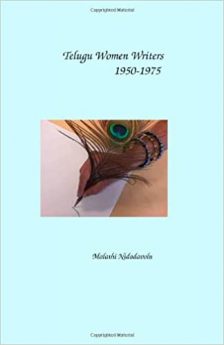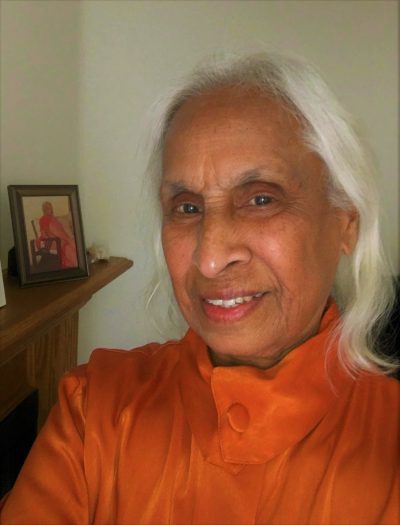Telugu Women writers-16
-Nidadvolu Malathi
One story illustrating the woman’s awareness, just awareness only, is “Eduru Chusina Muhurtam” [The Long Awaited Moment] by P. Saraladevi. The story illustrates woman’s perception of how she was being ignored by her family members.
At the age of six, little Durga started looking around and wanting the things she was noticing—things like a frock with printed flowers her friend was wearing, red satin ribbon for her braid, and nice dolls to show to her friends so she could make them jealous. She just heard her mother say that little Durga would be turning six the next day.
Durga went into the kitchen and asked her mother for a frock with printed flowers. Mother said, “We’ll see after your father came home.” Durga tried to figure out when that would be. She kept asking questions and mother was tired of it. Exasperated, mother snapped at her. Durga did not understand mother’s frustration but she learned to keep quiet thenceforth.
As she grew older and watched her friends show off their new clothes, she kept hoping that someday somebody would buy new clothes for her too and she could show off her new clothes too. That never happened, not even at the time of her sister’s wedding.
She started wearing saris. She understood that she would not get anything until and unless she asked for it but she would not ask anybody for anything. What she wanted did not happen. Not one person ever came to her and said, “Here, I got this for you”. Father did not care about her wants. Durga did not care about her brother. Mother was struggling to run the household on her own.
Durga finished her education and got a job. She brought home the first month’s salary. She hoped that her mother would say, “You go, get something for yourself.” Instead, her mother told her about the household expenses. Durga understood her responsibility.
She was bringing her salary each month and handing it to her mother, and losing heart in the process. Forget somebody saying, “I got this for you”; nobody even suggested, “Go, get something for yourself”.
She hoped that, after her marriage, her husband would fulfill her dream. That did not happen either. After her children were born, and they had grown up, things were still the same, she figured out.
She died. Somebody asked for a new sari to cover the dead body per custom. Duran’s son said, “I will bring one,” and muttered to himself, “I will bring a sari for my mother,” fingering the salary in his pocket.
Several stories depicted this theme—a woman’s awareness of herself as a person and a vague feeling that she is entitled to wanting a few things for herself.
The story, “Eduru Chusina Muhurtam”, was originally published in Telugu Swatantra in October 1960 and recently included in an anthology entitled Vismruta Katha [An Anthology of Forgotten Stories, 1930-1980] published in 1998. To me, the anthology highlights, and is an acknowledgment, that some of the good stories written by our writers are not given due credit. The compilers included stories by both men and women writers.
Noticeably, the protagonist in this story Durga did not voice her awareness of her identity. In the next story, “Madanta Mabbu” [A Fleck of Could] by Kalyanasundari Jagannath, we see the protagonist constantly struggling to save her marriage, which was at stake because of her husband’s one weakness, his jealousy. She was aware that, between the two of them, her husband and herself, she was the one capable of saving their marriage. In that, there is an element of traditional womanhood as had been envisaged in the past several centuries and also an awareness she was the only one who could save their marriage.
The synopsis is:
Bhagyam went to the lake to bring water. Seshayya, a childhood friend, was on his way home from the city. He saw her and stopped to tell her that her husband, Peddiraju, was coming home from the city that evening.
She burst into a big laugh. She felt a shower of nectar at her heart. In the next moment, she shuddered. She recalled a couple of incidents from the past.
On one occasion, Peddiraju he had gone out of town and returned home. He saw a glass of milk on the ledge and flowers in her braid and jumped to the wrong conclusion. She had explained her actions and he had apologized for mistaking her intention. After that, Bhagyam swore to herself that she would never give him a reason to feel jealous again.
On another occasion, they were hit by drought. The farm had failed for want of rains and Peddiraju had been forced to go to the city in search of work. The move was a heart breaker for both of them. He promised her he would bring a black sari with gold-threaded moon prints. He remembered that Bhagyam had seen such sari on her neighbor and liked it a lot.
Brooding over the past, she returned home from the lake, and noticed that Peddiraju had come and gone. He tossed the bundle he had brought for her through the window and left.
Bhagyam opened the bundle and saw the black sari with gold-threaded moon print. He remembered! She was disheartened; collapsed on the floor, and sat there in the dark, with her back to the window. A lightning struck, and the moonbeams bounced on the supper plates she had washed clean and set for both of them.
Outside, it was pouring down.
Unlike in the preceding story, the protagonist Bhagyam in this story, “A Fleck of Cloud,” speaks. She was aware of her husband’s weakness and willing to take charge of the situation.
Ranganayakamma has been most vocal in her defense of woman’s place in society ever since she has picked up the pen. In one of her early stories, “Aartanaadam” [A Desperate Cry], she depicts the story of a working class woman, Kannamma, in order to illustrate the desperate conditions of women in middle class families.
*****
(Contd..)


